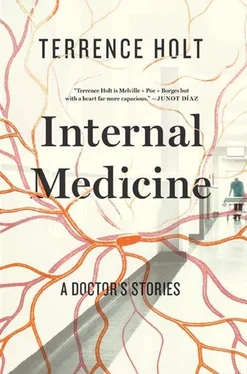Which it did, in an alarming series of loops and swerves, until we scattered gravel in front of a rambling one-story farmhouse standing in the midst of a rain-soaked yard. The sparse lawn was broken by a barely graveled arc on which we had come to rest beside a large gray pickup truck loaded with what appeared to be chicken coops. An old fruit tree, thrawn with age and neglect, dripped rainwater across a faint trace of bricks that marked the approach to a swaybacked porch.
Linda, muttering as she backed the Accord into a vacant patch of gravel, scanned the yard and surrounding outbuildings. The back of the house seemed to abut on an overgrown orchard. Linda surveyed this suspiciously for a minute. “Don’t see any,” she announced finally. She was talking about dogs, which she had explained to me our first morning were the only thing she really worried about on these visits. She had illustrated this by displaying a large, crescent-shaped scar on one calf. I followed her to the porch, hunching my shoulders to keep the rain off my neck.
On the screen door a handmade sign, black marker on a sheet of cardboard, read No Visitors . Behind the screen, the door stood slightly ajar; it bore another handmade sign with the same message. As we stood looking at the signs, the door opened abruptly, framing a very large man in a faded flannel shirt, with a round face and pale curly hair fading to bald on top. He eyed us warily.
“Hospice,” Linda called through the screen, a jaunty singsong, two notes, descending. She showed him her backpack as if it explained our mission.
A weary look of relief broke through the suspicion. “Sorry about the sign,” he said as he backed out of the doorway. “We had trouble yesterday.”
“What sort of trouble?” Linda was already in, peering around the darkened interior like a bird looking for something to peck.
“Some ladies from our church.” He fell silent for a moment and I could see the muscles of his jaw knot suddenly. “They wanted to tell Sylvie how she’s going to Hell.”
“Shit,” said Linda.
Mr. Turner nodded once emphatically. For a moment he looked as though he was about to cry.
“Is she okay?”
He glanced reflexively into the darkened interior. “She had a bad night.”
“Could we see her?” She shouldered her pack, then caught herself, held out a hand, and made introductions.
He took her hand, looked over his shoulder at me. “Charles Turner,” he said gruffly. “Thanks for coming.” He turned toward the interior. “She’s in here.”
He led us down a dim hallway, and as my eyes adjusted to the interior murk I was startled: under a ceiling at least twelve feet high every wall was filled with paintings. Not reproductions, I realized: oils on canvas, framed and hung one above another from the chair rail to the pressed-tin ceiling. Landscapes, most of them, graceful imitations of Constable; some were portraits after Reynolds. They were beautifully executed: solemn, Academy-quality exercises in every way, except that in almost every one the classical landscape was disrupted by the presence of large tropical birds: scarlet macaws, cockatiels, lovebirds, flocks of parakeets. In the portraits, birds perched on shoulders, peered coyly from behind the sitters’ heads, or preened on outstretched fingers, the sitters gazing lovingly. Massed above us in the darkened hallway, their effect was slightly hallucinatory.
Turner paused as we stared upward. “I framed them,” he said quietly.
We looked at him.
“They’re Sylvie’s,” he added, surprised at our obtuseness.
He led us through a doorway at the end of the hall. We entered a dining room, which by the clutter everywhere had not been used for dining in a long time. A battered mahogany table, chairs and sideboard cowered beneath canvases depicting enormous parrots; these were minimalist, primary-color cartoons on a stark white ground. We moved on to another low hallway. At the far end, a half-light door let out onto what looked like a chicken house: wire cages and roosts, rustling forms, an occasional muted screech. Turner led us through another door and there was the bedroom.
The curtains were drawn. The dim light of the rainy day outside barely illuminated the canvases that lined each high wall: a kitchen table in sunlight, large earthenware bowls with birds roosting on their rims; a picnic after Manet, the figures holding out crackers toward the trees; a tropical waterfall with small pink forms that I realized after a moment’s confusion were human infants, winged, fluttering through the mist. In the surrounding trees, enormous cockatoos were sheltering untidy nests, from which more small human faces peeped. In a queen-sized bed Sylvia Turner lay, shrouded by a flesh-colored chenille spread. She had watched us come into the room: her eyes — large, liquid, and brown — had followed us as we entered, and I’d been aware of them on us as we stopped and took in the display on the walls. Her expression as we gazed upward was hard to read.
I’d had the impression that the bedspread had been pulled up almost to her eyes, but as I stopped staring, finally, at the paintings and turned to the bed (where Linda was already bending over, her hand out to take Sylvia’s), I saw that what I had mistaken for part of the bedspread was a surgical mask covering the lower half of her face. It ballooned slightly in rhythm with the rise and fall of her chest; it fluttered when she spoke. It muffled her voice as she said something in reply to Linda’s questions about her pain, or I thought it did, and then I realized her voice was simply indistinct, as if speaking around a mouthful of pebbles, the consonants slurred or reduced to soundless puffs into the mask.
It was the sound of her voice that made me look at her.
She looked back, the eyes shrinking from mine at first, then coming back to meet my gaze a moment, then sheering away.
I continued to stare. There was nothing there but a surgical mask, no sign of anything unusual about it at all, except that it was overlarge: the edges lapped over her ears, the ties barely visible as they extended around her head and neck. Just a large white surgical mask. I could barely keep my eyes off of it.
I realized Linda was speaking to me.
“She says the Roxanol isn’t working.”
I nodded, still struck mute at the mask fluttering in and out.
“Roxanol,” I said stupidly. Roxanol is an old brand name for a concentrated elixir of morphine, the mainstay of hospice care. No IV needed: just a drop or two under the tongue and it’s absorbed.
“I think maybe she’s not absorbing.” Linda bent and whispered something. The eyes closed briefly as the head bobbed once on the pillow. Guttural noises whispered back into the nurse’s ear.
Linda straightened abruptly as if recoiling, caught herself, and walked around the bed to my side to speak confidentially.
“She says her tongue’s pretty much gone.” She paused, suppressing something I could not read in her face, then added, so softly and fast I almost couldn’t catch it, “Most of it sloughed off a few nights ago.”
I stared at her.
“That’s why she’s not eating.”
I didn’t know what to say.
“Say something,” she hissed, nudging me with one elbow. She gestured with her head toward the face on the pillow.
“Mrs. Turner?” I said as I edged toward it. “I’m Dr. Harper.” I stopped at the head of the bed. The mask fluttered, but no sound came out.
I reached out and took her hand. She let me, let it rise off the bedspread as I went through the motions of taking her pulse. This is something they teach you in medical school: when you don’t know what else to do, check the pulse. It breaks the ice.
Her pulse was on the rapid side, and not very vigorous. Looking at her eyes, I suspected she was dehydrated.
Читать дальше












